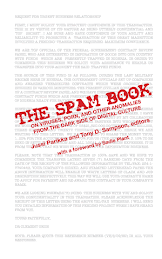Organized by ArcDigital and sponsored by CoDE -- the Cultures of the Digital Economy-institute
4 pm, room: Hel 251
Premediation, Affect and the Anticipation of Security
In this talk professor Grusin will explore how in our current biopolitical regime of securitization, socially networked media transactions are fostered and encouraged by mobilizing or intensifying pleasurable affects in the production of multiple, overlapping feedback loops among people (individually and collectively) and their media. Grusin outlines how, at the end of the first decade of the 21st century, social media, like cell phones, instant messaging, Facebook, or YouTube, encourage different historical formations of mediated affect. This distribution of affectivity across heterogeneous social networks or assemblages is coupled to the framework of securitization, which helps to explain why these particular socially networked media formations have emerged at this particular historical moment. The talk concludes with a discussion of the political implications of this security regime—what it means for the explosive growth of socially networked media after 9/11 to have as one of its many consequences the proliferation of media transactions or interactions, which help to “vitalize” the political formation of securitization. If mediality today employs the strategies of premediation to mobilize individual and collective affect in a society of security and control, then we need to look at the ways in which premediation deploys an affectivity of anticipation that functions to vitalize the regime of securitization that has replaced surveillance as the predominant disciplinary formation of our control society. Our everyday transactions of mediation, transportation, and communication are encouraged for security purposes not only by making them easy and readily available but also by making them affectively pleasurable—or at least not unpleasurable, by maintaining low levels of affective intensity that provide a kind of buffer or safe space, a form of security, in relation to an increasingly threatening global media environment.
Richard Grusin is Professor of English at Wayne State University. His more recent work concerns historical, cultural, and aesthetic aspects of technologies of visual representation. With Jay David Bolter he is the author of Remediation: Understanding New Media (MIT, 1999), which sketches out a genealogy of new media, beginning with the contradictory visual logics underlying contemporary digital media. Grusin’s Culture, Technology, and the Creation of America’s National Parks (Cambridge, 2004), focuses on the problematics of visual representation involved in the founding of America's national parks. He has just completed his new book Premediation: Affect and Mediality after 9/11. (forthcoming 2010)








No comments:
Post a Comment